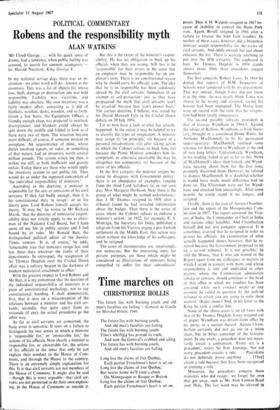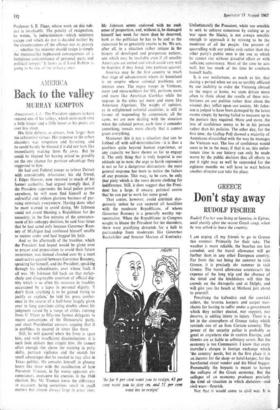Robens and the responsibility myth
POLITICAL COMMENTARY ALAN WATKINS
'Mr Lloyd George . . with his quick sense of drama, had a tendency, when public feeling was aroused, to search for eminent scapegoats.'— Sir Harold Nicolson, King George V.
In my national service days there was an in- stitution—no other word will do—known as the inventory. This was a list of objects for whose loss, theft, damage or destruction one was held responsible. Liability was vicarious, and liability was absolute. My own inventory was a fairly modest affair, consisting as it did of blankets, woollen, desks, wooden, and so forth. Given a few beers, the Equipment Officer, a friendly enough chap, was prepared to overlook discrepancies; and blankets could always be split down the middle and folded to look as if there were two of them. The situation became more difficult, of course, if someone mislaid an aeroplane. An acquaintance of mine, whose duties involved signals, or radar, or something of that nature, had an inventory worth several million pounds. The system struck me then, it strikes me still, as both inefficient and grossly unfair. Today there are those who would apply the inventory system to our public life. They would do so under the supposed convention of 'the individual responsibility of ministers.'
According to the doctrine, a minister is responsible for the acts or omissions of his civil servants. If they fail badly enough, then it is his constitutional duty to resign: or so the theory goes. Lord Robens himself accepts the theory. 'It may be,' he writes to Mr Richard Marsh, 'that the doctrine of ministerial respon- sibility does not strictly apply to me as chair- man of the National Coal Board, but I have spent all my life in public service and I feel bound by its rules.' Mr Ronald Butt, the distinguished political editor of the Sunday Times, concurs. 'It is, of course,' he adds, 'lamentably true that ministers resign less and less these days whatever the faults of their departments. In retrospect, the resignation of Sir Thomas Dugdale over the Crichel Down affair was a solitary beacon in the darkness of modern ministerial attachment to office.'
With the greatest respect to Lord Robens and Mr Butt, it is my contention that the doctrine of the individual responsibility of ministers is a piece of constitutional mythology, not to say constitutional humbug. I shall demonstrate, first, that it rests on a misconception of the relations between a minister and his civil ser- vants; secondly, that quite apart from its rationale (if any), the actual precedents go the other way.
As far as civil servants are concerned, the basic error is semantic. It rests on a failure to distinguish the two senses in which a minister is 'responsible for,' or 'answerable for,' the actions of his officials. Now clearly a minister is responsible for, or answerable for, the actions of his officials in the sense that only he can explain their conduct to the House of Com- mons, and through the House to the country. There is an extremely simple explanation for this. It is that civil servants are not members of the House of Commons. It might also be said —though this is more arguable—that civil ser- vants are not permitted to do their own explain- ing, in the House of Commons or outside it. But this is the extent of the minister's respon- sibility.' He has no obligation to back up his officials when they are wrong. Still less is he 'responsible' for their errors in the sense that an employer may be responsible for an em- ployee's torts. There is no constitutional reason why he should carry his officials' cans. The idea that he is so responsible has been sedulously spread by the civil servants themselves in an attempt at self-protection—just as they have propagated the myth that civil servants 'can't be attacked' because they 'can't answer back.' The correct doctrine, I believe, was stated by Sir David Maxwell Fyfe in the Crichel Down debate on 20 July 1954.
Let us now have a look at what has actually happened. At the outset it may be helpful to try to classify the types of resignation. A minister may resign (i) 'on principle,' (ii) because of a personal misadventure, (iii) after taking action in which the Cabinet refuses to back him, (iv) because the Prime Minister considers him in- competent, or otherwise unsuitable (he may be altogether too competent), (v) because of the error of his officials.
In the first category the minister resigns be- cause he disagrees with Government policy: there is an abundance of examples, ranging from the third Lord Salisbury to, in our own day, Miss Margaret Herbison. Next there is the group of what might be termed unfortunates: thus J. H. Thomas resigned in 1936 after a tribunal found he had revealed information about the budget. Then there is the series of cases where the Cabinet refuses to endorse a minister's action: in 1922, for example, E. S. Montagu, the Secretary for India, published a telegram from the Viceroy urging a pro-Turkish settlement in the Middle East; this action was taken without the knowledge of his colleagues, and he resigned.
The cases of incompetence are, surprisingly, not numerous. But the interesting ones, for present purposes, are those which might be considered as illustrations of ministers being compelled to suffer for their subordinates'
errors. Thus S. H. Walpole resigned in 1867 be- cause of inability to control the Hyde Park riots. Again, Birrell resigned in 1916 after a failure to foresee the Sinn Fein troubles. In neither of these cases, however, did a blameless minister accept responsibility for the errors of civil servants. And oddly enough this just about exhausts the list. There is scarcely anything to put into the fifth category. The cupboard is bare. Sir Thomas Dugdale in 1954 stands almost alone. Only three precedents suggest themselves.
The first concerns Robert Lowe. In 1864 he denied that reports of H.M. Inspectors of Schools were tampered with by his department. This was untrue, though Lowe did not know it at the time—he was nearly blind. Lowe was shown to be wrong and resigned, saying his honour had been impugned. The House later went on record with the view that his resigna- tion had been totally unnecessary.
The second possibly relevant precedent is that of George Wyndham in 1904-5. Against the advice of Balfour, Wyndham, as Irish Secre- tary, brought in a convinced Home Ruler, Sir Anthony MacDonnell, to be his permanent under-secretary. MacDonnell outlined some schemes for devolution to Wyndham at the end of two long letters. Unfortunately Wyndham, in his reading, failed to get as far as this. News of MacDonnell's ideas then leaked, and Wynd- ham, hearing about them for the first time promptly disowned them. However, he refused to dismiss MacDonnell. It is doubtful whether it would have made much difference had he done so. The Ulstermen were out for Wynd- ham, and attacked him unceasingly. After some months he could stand it no longer, and resigned.
Thirdly, there is the case of Austen Chamber- lain and the report of the Mesopotamia Corn- mission in 1917. The report censured the Vice- roy of India, the Commander in Chief in India and various other notables. And Chamberlain himself did not win complete approval. It is sometimes asserted that he resigned in order to protect his officials. An examination of what actually happened shows, however, that he re- signed because the Government proposed to Set up a second tribunal. 'It is not possible,' he told the House, 'that I, who am named in the Report apart from my colleagues in matters in which I acted in concert with them, and whose responsibility is sole and undivided in other matters where the Commission administers rebuke or censure, should continue as the head of that office in which my conduct has been censured while such conduct might at any moment be called in question by the judicial tribunal to which you are going to refer these matters.' (Italics mine.) And, in his letter to the King, he took a similar line.
None of the above cases is on all fours with that of Sir Thomas Dugdale. Lowe resigned .out of pique; Wyndham was driven from office by his party, or a section thereof; Austen Cham- berlain certainly did not go out in a white sheet, but in bitter contempt of the Govern- ment. In any event, a precedent does not neces- sarily create a convention. 'Every act is a precedent,' writes Sir Ivor Jennings. 'but not every precedent creates a rule. . . Precedents do not definitely prove anything. . . . [They] create a rule because they have been recognised as creating a rule.'
Moreover, the precedents concern those ministers who did resign: we forget the ones that got away, such as Mr Alan Lennox-Boyd over Hola. The last word may be allowed to
Professor S. E. Finer, whose work on this sub- ject is invaluable. The penalty of resignation, he writes, 'is indiscriminate—which ministers escape and which do not is decided neither by the circumstances of the offence nor its gravity . .. whether the minister should resign is simply the (necessarily) haphazard consequences of a fortuitous concomitance of personal, party and political temper.' It looks as if Lord Robens is going to be one of the unlucky ones.































 Previous page
Previous page